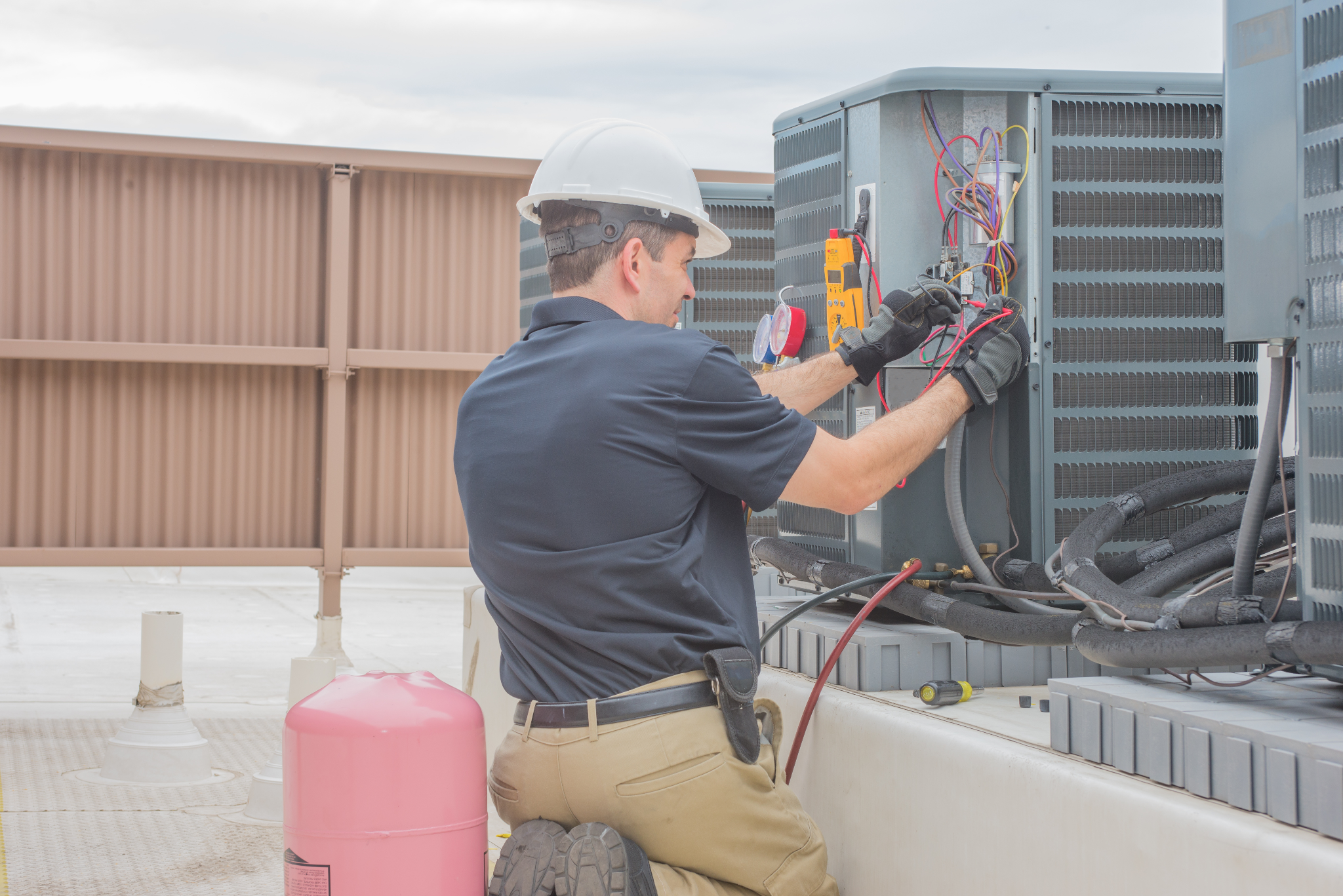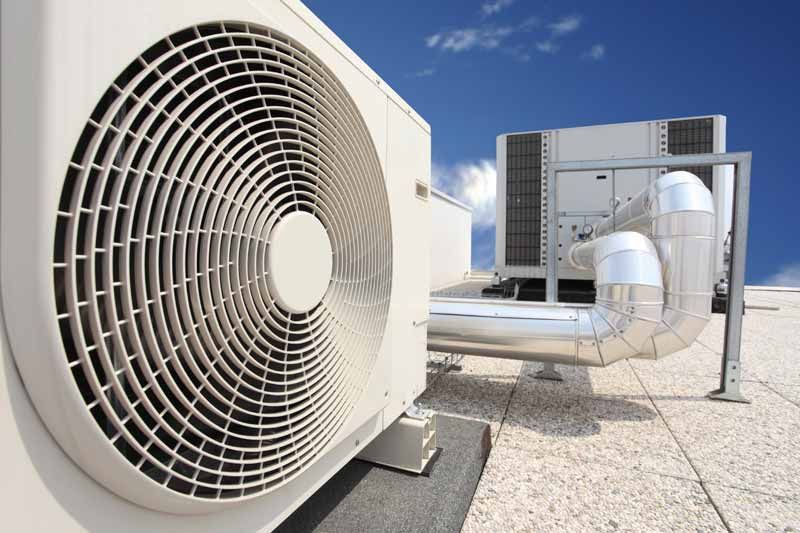Choosing In Between a Heatpump and Heating System: Trick Considerations for Your Cooling And Heating Demands
When assessing heating choices for cooling and heating requires, the decision in between a warmth pump and a heater can be intricate. Each system supplies distinctive advantages tailored to details climates and energy effectiveness objectives. Recognizing these distinctions is vital for making an educated option. Trick variables such as setup prices and ecological influence even more complicate the selection process. Which choice absolutely straightens with one's convenience and sustainability choices? The adhering to sections will certainly discover these considerations carefully.
Comprehending Heat Pumps: Just How They Work and Their Benefits
While numerous property owners think about different home heating options, recognizing exactly how warmth pumps feature and their benefits can greatly influence their choice. Warm pumps run by transferring warmth as opposed to generating it. In the winter months, they extract warm from the outdoors air or ground and move it indoors, while in the summer season, they reverse this process, cooling down the home by getting rid of warm outside. This twin capability makes them versatile for year-round environment control.One of the key advantages of heatpump is their power effectiveness. They utilize considerably much less power compared to typical heating unit, possibly leading to lower energy costs (heat pump service). Furthermore, heatpump have a smaller sized carbon impact, making them an eco friendly option. They likewise require less upkeep than conventional systems, adding to lasting expense financial savings. Overall, recognizing the mechanics and advantages of warm pumps can help property owners make informed decisions concerning their heating and cooling demands
Exploring Heaters: Types, Procedure, and Advantages
Heaters can be found in various types, consisting of gas, electrical, and oil versions, each with distinct operational mechanisms. Recognizing these differences is important, as they impact effectiveness and heating performance. Furthermore, heaters supply various advantages, such as consistent heat result and dependability in colder climates.
Sorts of Furnaces
Heating systems can differ substantially in design and procedure, with furnaces being a preferred selection among home owners. There are numerous kinds of heaters, each utilizing various fuel resources and modern technologies. Gas furnaces are typical, leveraging gas to create warmth efficiently. Electric heaters, on the various other hand, make use of electrical resistance to create heat, often preferred for their simple setup. Oil heating systems, while much less usual, work in areas with restricted gas gain access to (heat pump service). In addition, condensing heaters make best use of power performance by recycling and recording exhaust gases. Each type operates via a system of warmth exchangers and ductwork to distribute cozy air throughout a home. Recognizing the distinctions in between these heating system kinds is crucial for notified heating and cooling choices
Benefits of Heaters
For house owners seeking reliable heat throughout cool months, the advantages of heaters are considerable. Heaters offer consistent home heating, ensuring even temperature levels throughout the home. They are particularly efficient in severe cold, usually outmatching heatpump in cold problems. Different types, including gas, electric, and oil furnaces, supply flexibility to fulfill diverse demands and preferences.Furnaces also often tend to have reduced first setup expenses contrasted to heat pumps, making them a much more available choice for numerous. Their durable layout adds to a much longer life-span, with many units lasting over 15 years with appropriate maintenance. In addition, modern-day heating systems are typically furnished with innovative innovation for improved efficiency, which can lead to minimized power costs. Overall, heating systems remain a reputable selection for effective home heating.

Energy Effectiveness: Comparing Warm Pumps and Furnaces
When comparing power effectiveness between warm pumps and heaters, the Seasonal Energy Efficiency Proportion (SEER) plays a necessary function in establishing performance. In addition, a functional price analysis exposes the lasting monetary implications of each system. Comprehending these elements can lead homeowners in making educated choices regarding their home heating options.
Seasonal Energy Effectiveness Ratio
Energy efficiency plays a crucial duty in the decision-making procedure in between warm pumps and heaters, specifically when considering the Seasonal Energy Efficiency Proportion (SEER) This statistics measures the cooling performance of warm pumps over a whole cooling period, providing a standard way to assess efficiency. Greater SEER rankings suggest better power performance, translating to reduced energy intake and minimized utility bills. In comparison, heaters are typically analyzed making use of the Yearly Fuel Usage Effectiveness (AFUE) score, which mirrors heating performance. When comparing these 2 systems, house owners should focus on SEER rankings for warm pumps, as they straight impact total energy cost savings and environmental sustainability. An extensive understanding of SEER can significantly affect the long-term complete satisfaction and cost-effectiveness of the picked heating and cooling option.
Functional Cost Evaluation
Recognizing the operational prices linked with warmth pumps and heating systems is essential for homeowners assessing their alternatives. Heatpump usually use higher energy effectiveness, converting you can look here electrical power right into warm with marginal waste. This causes lower monthly energy costs, especially in moderate climates. Alternatively, traditional furnaces, especially gas models, might have lower ahead of time expenses but can sustain higher functional costs in time due to fuel costs and effectiveness ratings.Moreover, heatpump can operate as both home heating and cooling down systems, potentially minimizing the requirement for different a/c units. While preliminary financial investments for heatpump might be greater, their lasting savings in power effectiveness can make them a much more economical option for lots of families. Careful analysis of local power rates is vital to establish the most effective option.
Setup Costs: What to Anticipate for each and every Heater
Setup expenses for heater can vary considerably between heat pumps and furnaces, influencing property owners' choices. Heatpump typically have greater upfront setup prices, generally varying from $3,500 to $8,000, depending upon the unit dimension and intricacy of setup. This consists of the outside unit, interior handling system, and required ductwork adjustments. On the other hand, heating systems tend to have lower preliminary expenses, averaging in between $2,500 and $6,000, which can be appealing for budget-conscious house owners. Installation expenditures can raise if extensive ductwork is required.Moreover, the choice of fuel kind for heating systems-- natural gas, lp, or electric-- can also influence installation prices. While heat pumps offer energy effectiveness, their initial financial investment may hinder some customers. Ultimately, reviewing installment costs along with long-lasting financial savings and efficiency will certainly aid homeowners in making educated choices concerning their furnace.
Environment Factors To Consider: Which System Carries Out Much Better in Your Location
Just how do environment conditions affect the effectiveness of furnace? The performance of warm pumps and heaters can differ significantly depending upon the regional climate. In moderate climates, warmth pumps succeed by efficiently moving heat from the outdoors air, making them an energy-saving option. However, their performance decreases in exceptionally chilly temperatures, where they may have a hard time to remove enough warm. Conversely, furnaces, especially gas models, provide reputable and consistent heat no matter of outside conditions, making them better in chillier regions.In locations that experience milder winters months, heatpump can operate efficiently year-round, offering both heating and air conditioning. In comparison, areas with rough winter seasons commonly gain from the effectiveness of heating systems. Inevitably, comprehending the local climate is important when determining between a warmth pump and a heating system, as it directly impacts their operational performance and general efficiency.
Upkeep Demands: Long-Term Treatment for Heat Pumps vs. Furnaces
While both heatpump and heating systems call for normal upkeep to ensure peak performance, their specific needs and care regimens differ considerably. Furnaces usually need less regular interest, with annual assessments sufficing to check for gas leaks, clean filters, and assess total capability. Their less complex layout commonly permits uncomplicated repairs.In comparison, warm pumps require semiannual maintenance due to their twin duty in heating & cooling. This includes cleansing coils, examining refrigerant degrees, and making sure that both the outside and indoor units function at their best. Additionally, heat pump maintenance usually entails more complex parts, making specialist servicing essential.Neglecting upkeep can lead to reduced performance and raised power costs for both systems. Inevitably, property owners should take into consideration these long-lasting treatment requirements when selecting between a heatpump and a furnace, as aggressive maintenance can expand the lifespan and performance of either system considerably.
Environmental Influence: Picking a Lasting Home Heating Alternative
The environmental influence of heater is an important evaluation for property owners looking for lasting alternatives. Heatpump are usually more energy-efficient than standard heaters, as they move heat rather than generate it, significantly decreasing carbon emissions. By utilizing renewable resource resources, such as air-source or geothermal heatpump, house owners can additionally reduce their environmental footprint.On the other hand, natural gas heaters give off greenhouse gases and add to air pollution, though they typically provide greater heat result. Nonetheless, advancements in technology have actually resulted in the development of high-efficiency furnaces that minimize emissions.Ultimately, selecting a heating unit includes weighing performance against ecological impact. Property owners are encouraged to review local energy resources and rewards for sustainable systems, guaranteeing a choice that lines up with both individual convenience and ecological obligation. The decision impacts not only prompt convenience but additionally long-term sustainability and ecological health and wellness.
Often Asked Inquiries
How Much Time Do Warm Pumps and Furnaces Usually Last?
The lifespan of warmth pumps usually you could try here ranges from 15 to two decades, while heating systems can last between 15 to thirty years. Normal maintenance significantly impacts their long life and effectiveness in providing home heating solutions.
Can I Utilize a Heat Pump in Very Cold Climates?
Heat pumps can operate in very cool climates, but their performance reduces as temperature levels drop. In such problems, additional home heating sources may be essential to maintain comfortable interior temperatures and ensure peak performance.

What Is the Sound Level of Warmth Pumps Versus Furnaces?
The sound levels of heatpump and furnaces differ significantly. Typically, heatpump run more quietly than conventional heating systems, making them better for those delicate to sound, while heaters might create louder operational sounds during heating cycles.
Are Heat Pumps Suitable for Both Home Heating and Air conditioning?
Heatpump are without a doubt ideal for both cooling and heating (heat pump service). They operate by transferring heat, supplying effective temperature level control year-round, making them a functional option for house owners seeking an all-in-one HVAC check this site out option
What Size Heating Unit Do I Need for My Home?
Figuring out the appropriate dimension home heating system for a home calls for reviewing aspects such as square footage, insulation high quality, local climate, and the home's format. Consulting a professional can ensure an exact evaluation and ideal convenience. Warmth pumps commonly use greater energy efficiency, transforming electrical power into warmth with very little waste. In modest climates, heat pumps succeed by efficiently transferring warmth from the outside air, making them an energy-saving option. Conversely, heaters, especially gas models, offer constant and reputable heat no matter of outside conditions, making them more suitable in colder regions.In locations that experience milder winter seasons, heat pumps can operate effectively year-round, supplying both home heating and air conditioning. Warmth pumps are usually more energy-efficient than conventional heating systems, as they move warm instead than create it, greatly decreasing carbon discharges. By using sustainable power resources, such as air-source or geothermal warmth pumps, property owners can better lessen their ecological footprint.On the various other hand, natural gas furnaces give off greenhouse gases and add to air pollution, though they often offer higher warm result.